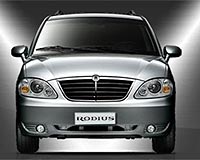 |
Beijing (AFP) Dec 19, 2009 Mao Chunchun and her husband stand in the sprawling Yayuncun Auto Market on the outskirts of Beijing eyeing Hyundai sports utility vehicles on offer for as much as 250,000 yuan (36,600 dollars). The couple are hunting for their third car just as Beijing traffic hits a new milestone with four million registered vehicles, according to state media. The spiralling number of cars on the roads of China's sprawling capital are a sign both of the increasing affluence of the city's middle class -- and the challenge the government faces in terms of reducing toxic air pollution. "I am going to sell (one of my cars) and buy a new one," Mao, 26, told AFP. "I can't own too many at the same time. Isn't it bad for the environment?" The number of registered vehicles in Beijing -- well known for its traffic jams and poor air quality -- topped four million this week, state Xinhua news agency reported late Friday, citing the municipal government. The four million mark means a quarter of the 16 million permanent residents in the city has a car. As a taxi driver for the past five years, Qiu Haitao is used to being stuck in traffic and doing battle with novice drivers. "From Monday to Friday it is like this," Qiu told AFP, pointing at dozens of cars blocking a major intersection. "There are more cars on the road and at the same time new drivers are increasing so there are more minor accidents." And the congestion will only get worse, with around 2,000 new cars sold daily in the increasingly wealthy city. "Compared with other metropolises in the world, the growth in the number of vehicles in Beijing is dramatic," Guo Jifu, researcher with the Beijing Municipal Communication Research Centre, told Xinhua news agency. It took Beijing 48 years for the number of vehicles on its streets to increase from 2,300 in 1949 to the first one million in 1997. It took six and a half years to register the second million, Xinhua said, and the pace of growth has continued to accelerate. Greenpeace China said the government needed to "urgently develop a comprehensive vision for a sustainable transportation future". "Cars are a dominant cause of the severe air pollution and traffic congestion in Beijing and other major cities in China," said Liu Shuang, the group's climate and energy campaigner. Last year, government vehicles and all private automobiles were banned from Beijing's roads for one day each week, depending on their licence plate number, in measures aimed at easing congestion and curbing emissions. But some drivers complain that the restrictions have only exacerbated the problem by encouraging people to buy another car. "Many rich people are buying a second car because of the rule," one unnamed driver told state media last week. "It is just very inconvenient not to drive on certain days of the week." Beijing's air is among the most polluted in the world, and the problem is getting worse amid high demand for private vehicles from its increasingly affluent residents, who shun taking the underground rail and buses. "It is more convenient than public transport and I can take my family for excursions," said Mao, who has two children. China's total car sales outstripped those of the United States for the first time in January to make the Asian giant the world's biggest auto market, helped by government efforts to stimulate domestic consumption. While people living in Beijing's outer suburbs with limited public transport need a car, many others buy a vehicle simply to show off to their friends, said Qiu. "Owning a car is a symbol of your social status," he said. "I like cars. If I had the money I would buy one." Share This Article With Planet Earth
Related Links Car Technology at SpaceMart.com
 S.Korea court approves rescue plan for Ssangyong
S.Korea court approves rescue plan for SsangyongSeoul (AFP) Dec 17, 2009 South Korea's debt-burdened Ssangyong Motor was on Thursday thrown a new lifeline after a court approved a rescue plan that had recently been rejected by the automaker's foreign creditors. The announcement, which will save hundreds of thousands of jobs, will allow the company to restructure as it faces debts of more than a billion dollars. "We came to this decision as Ssangyong's value ... read more |
|
| The content herein, unless otherwise known to be public domain, are Copyright 1995-2009 - SpaceDaily. AFP and UPI Wire Stories are copyright Agence France-Presse and United Press International. ESA Portal Reports are copyright European Space Agency. All NASA sourced material is public domain. Additional copyrights may apply in whole or part to other bona fide parties. Advertising does not imply endorsement,agreement or approval of any opinions, statements or information provided by SpaceDaily on any Web page published or hosted by SpaceDaily. Privacy Statement |